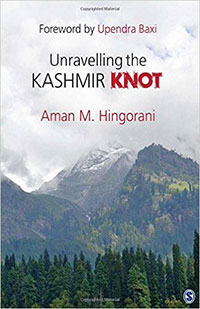A new book rules out war, peace talks, reconciliation, reunion and all other time-tested conflict resolution models and instead proposes a fresh idea backed by strong documentary evidence
What is today the mother of all imbroglios, Kashmir, was a script directed by the wily British rulers, as part of their design to divide India. The British had used Mohammad Ali Jinnah to veto the idea of an independent India without a separate homeland for Muslims and fuelled hate between Hindus and Muslims to divide India. Even the soft-faced Lord Mountbatten, the first governor general of independent India, was found manipulating situations and influencing minds – in New Delhi and Karachi – to help the newly formed Pakistan get most in the division. The British authorities in London had even ignored warnings sent by its India-based officials that a religion-based divide would lead to violence of unimaginable proportion that eventually happened.
 In his book Unravelling the Kashmir Knot, supreme court advocate Aman M Hingorani tries to give fresh insights into the events leading to the partition and the complicated Kashmir problem that arose soon and which was to become a festering wound for India for years to come. The author randomly handpicks a version of those events from other books, official papers, and published documents to draw a narrative about how the British had worked out the partition to secure their long term geo-strategic interests in the sub-continent. Under a meticulous plan, the British pushed the idea of the northwestern territory of India becoming Pakistan. The area was the gateway to oil-rich central Asia and Gulf region and therefore of perennial geo-strategic importance. The British had unabashedly supported Pakistan’s cause in the post-partition conflicts with the sole purpose of using the young nation as a strategic ally. They knew that India with its formidable leadership would be predisposed to the Soviet Bloc and therefore a hard nut to crack. However, the book reiterates instances from history to make a point about the credulous Indian leadership who either didn’t see or choose to ignore the manipulations by the world community against India on the issue of Kashmir.
In his book Unravelling the Kashmir Knot, supreme court advocate Aman M Hingorani tries to give fresh insights into the events leading to the partition and the complicated Kashmir problem that arose soon and which was to become a festering wound for India for years to come. The author randomly handpicks a version of those events from other books, official papers, and published documents to draw a narrative about how the British had worked out the partition to secure their long term geo-strategic interests in the sub-continent. Under a meticulous plan, the British pushed the idea of the northwestern territory of India becoming Pakistan. The area was the gateway to oil-rich central Asia and Gulf region and therefore of perennial geo-strategic importance. The British had unabashedly supported Pakistan’s cause in the post-partition conflicts with the sole purpose of using the young nation as a strategic ally. They knew that India with its formidable leadership would be predisposed to the Soviet Bloc and therefore a hard nut to crack. However, the book reiterates instances from history to make a point about the credulous Indian leadership who either didn’t see or choose to ignore the manipulations by the world community against India on the issue of Kashmir.
The law governing the partition gave powers to the sovereign rulers of 500-plus Indian states to decide on joining the newly created domains of India or Pakistan. Princely rulers of Junagarh in Gujarat and Hyderabad in the south resisted joining India. Being Hindu majority states, there were even talks of going for a referendum to decide people’s choice. Interestingly, both the rulers soon gave up their rebellion after a bit of muscle-flexing by New Delhi. However, the talk of referendum triggered in these cases was conveniently used by Pakistan to checkmate India at the United Nations on Kashmir. Indian leaders who had knocked at the door of the world body against Pakistan’s attack on Kashmir in 1948 had unwittingly ended up making a commitment to hold a plebiscite in J&K to determine people’s choice between India and Pakistan. The author says India had fallen into a trap laid by the British with Pakistan’s help.
The British had always wanted Kashmir to be part of Pakistan or remain a neutral independent territory to suit their interests. However, when it didn’t happen, they decided to complicate the issue so that India would always have a tenuous relationship and control over its northern-most and Muslim-majority territory.
Is there a way out? Hingorani has tried to touch upon all possible solutions to the vexed issue that has turned into a human tragedy and a constant cause of Indo-Pak conflict. He rules out war, peace talk, reconciliation, reunion and all other time-tested conflict resolution models and instead proposes – with strong documentary evidence – a new idea.
The book leads to a conclusion that India needs to look at the Kashmir issue from a legal angle. It says on pure legal basis India has a strong case and can turn the tables on Pakistan. As such Pakistan has not recognised PoK as its territory and also ceded part of it to China and converted some part into federal territory without any legal backing. New Delhi should, perhaps, look at the idea of going to the International Court of Justice (ICJ) on this, the book concludes.
Book details:
Unravelling the Kashmir KNOT
By Aman Hingorani
Sage Publications
386 pages, Rs 995
The book review appears in the August 1-15, 2016 issue
